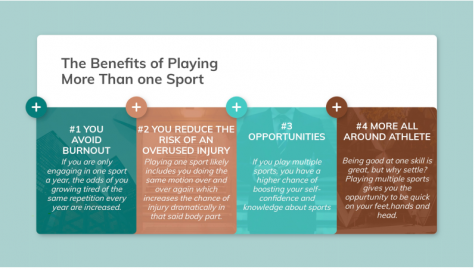Is Playing One Sport Worth It In the Long Run?
In an era where so much is expected out of young athletes, it is quite convincing to drop all other activities and focus on one sport in order to excel, but is the small advantage worth all of the disadvantages that come along with it?
Apr 28, 2020
Every young kid at some point has had the dream of playing a sport and becoming the best athlete to ever do it. Although the odds of reaching the peak of the mountain are extremely low, these ambitious kids attempt to give themselves the best odds by specializing in one specific sport.
Although research has shown that specializing in a specific sport has shown to increase your chances of making it to the professional level, it comes with quite the cost. Increasing the risk of injury limits the options of trying to play other sports and the competition that comes with it is not the healthiest.
“I mean, no matter the situation, too much of one thing is never a good thing. This holds true regarding specialization in a sport with all the disadvantages that come with it,” sophomore Austin Schulte said.
Nowadays, the expectations set upon young athletes is so absurd that they are encouraged from a young age to specialize in one sport to maximize their potential. What most do not realize is that in doing so, they may never physically reach their full potential.
For example, let us look at a sixteen-year-old baseball pitcher in a hypothetical situation. This aspiring baseball star has been playing and first started pitching at the young age of just seven years old. For about nine years of his life, he has been constantly repeating the same powerful and swift motion with his arms. Although he may have an edge over his peers for specializing in pitching, his ceiling has already been set prematurely because of the high injury risks that he now holds in his pitching arm.
Specializing in a single sport at a young age also puts athletes in a box, preventing them from trying out all of the different types of sports and competition.
With the increasing levels of competition, starting as early as possible, which was once a suggestion, is now seen as a requirement. This short and quick time frame does not give the child enough time to try and pick the sport that they will be happiest with or have the best chance to succeed with.
Playing multiple sports gives children the opportunity to stay competitive year-round. Each sport is designated a specific season that is right for the athletes and the fans. For example, the basketball season is only from October to March, allowing athletes to be active for about six months out of the year.

Becoming a well-rounded athlete by competing in different playing fields is beneficial to young and aspiring athletes who are considering specialization in a singular sport.
Children who participate in sports year-round are less likely to lose motivation because they are engaging in a new activity where their abilities are being sharpened to help them become better all-around as an athlete.
Take the example of six-time National Basketball Association (NBA) champion Michael Jordan. Entering high school, where he attended Emsley A. Laney High School in Wilmington, he played on the school’s football and baseball team. Jordan attributed his success in his pro career to all of the different environments that he met on every type of field, court and interaction as a competitor.
“Playing a singular sport only gives you about three to four months of action during a year, making you sore when you start back up. It is clear why injuries occur more often and why it is best to be more balanced all year round,” sophomore Alejandro Delgado said.
There is a reason why the odds of making it to the highest level of a sport has less than a 0.01 percent chance of happening. It is because most players need to have that strong mental attitude.
Studies have shown that kids who specialize in one sport are often the first ones to quit. Only a handful of children are able to continuously play the one sport they love at an extremely high level. Most kids who take this route, however, often find themselves feeling burned out, lacking the enjoyment to the sport and just less overall motivation.
In today’s day and age of sports, the expectation set upon young kids have never been higher. The pressure to be the best at what they love can really derail and discourage some of these young athletes, especially when drastic measures and decisions are being made, such as specializing in one sport. Although, they are giving themselves a slight edge in that particular sport, the odds of losing motivation and putting themselves at higher risk of injury increases drastically, and it is important to evaluate one’s health and to look toward becoming well-balanced on any playing field.












